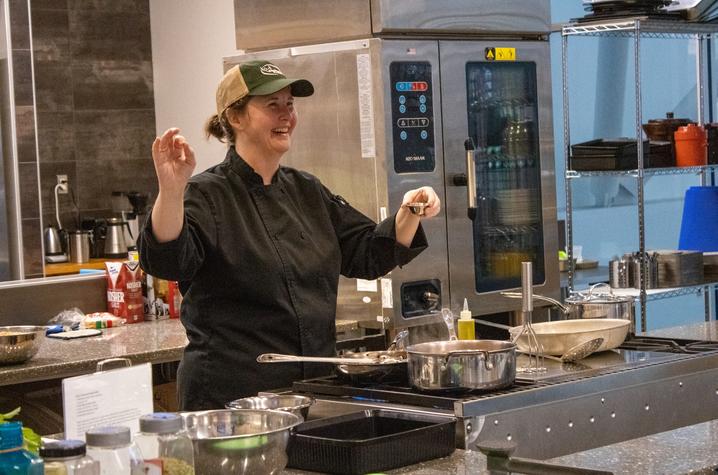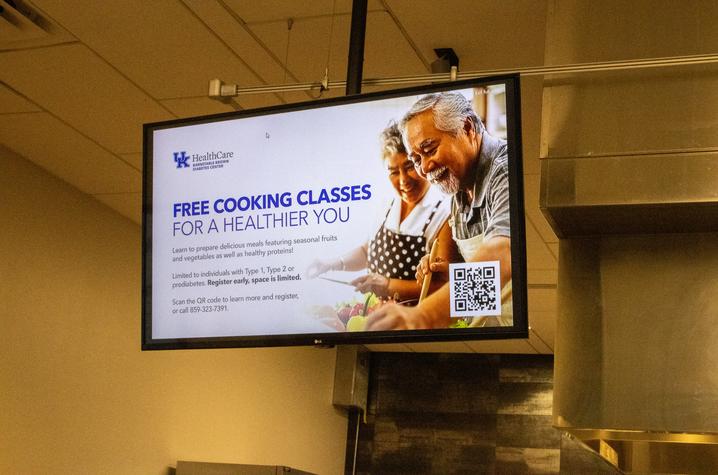Barnstable Brown, UK Food Connection team up to offer healthy cooking classes
LEXINGTON, Ky., (Sept. 28, 2022) — UK HealthCare’s Barnstable Brown Diabetes Center (BBDC) Medical Director Kristen Stakelin, M.D., often asks patients what vegetables they enjoy eating. She says it is a way for her to get to know their nutritional habits and screen if they are even getting any vegetables in their diet. One day while having this conversation, her patient named macaroni and cheese as one of their favorite veggies.
“I remember thinking, oh we have a long way to go here,” said Stakelin.
That encounter really got Stakelin thinking about how not only do many patients not eat vegetables or even know what they are, but they likely do not know how to prepare them even if they had them stocked in their kitchens.
“I often get a scrunched-up face when I ask what vegetables people like to eat. It is like people assume it must taste terrible to be good for you, which is not true at all,” said Stakelin.
Stakelin then reached out to Chef Tanya Whitehouse, program manager for The Food Connection Learning Kitchen at the UK College of Agriculture, Food and Environment. The Learning Kitchen is a state-of-the-art kitchen venue on the UK campus that offers a welcoming environment for everyone interested in learning about locally-sourced seasonal foods and how to enjoy them. Prior to joining UK’s Food Connection, Chef Tanya Whitehouse was the sous chef of Holly Hill Inn for Chef Ouita Michel.
With Whitehouse on board, Stakelin asked if she could focus some cooking classes on vegetable meals to prove that veggies can taste good, show people what all can be done to prepare them, and expose the participants to veggies they may not be familiar with. The classes cover everything from basic kitchen and knife safety, to ways to season vegetables without adding salt. The classes also include a short nutrition presentation by one of BBDC’s diabetes care and education specialists. Tami Ross, a registered dietitian and part of the education team, enjoyed seeing participants' faces light up when learning which vegetables are healthiest for managing blood sugar. The group discussed practical ways to fit in more of these vegetables and gleaned creative ideas from each other. Tami recalls one participant stating that the cooking classes were the highlight of her month! She said she had learned so much, made a new friend, and enjoyed the time around the table eating the foods prepared.
“I love spreading the word about local food and how delicious, nutritious and great for us it is. I try to feature a variety of vegetables to encourage people to explore new tastes and new ways of preparing vegetables with which they are already familiar,” said Whitehouse.
The chef says she is on a mission to make sure people do not miss out on incredible flavors because they haven’t tried something before, or they have had a bad experience with it.
“More than anything I want to show these intrepid cooks that you can eat within a certain prescribed dietary guideline and that it can be delicious and satisfying,” said Whitehouse.
The goal is for participants to walk into their kitchens confidently and not have to stress about what they are going to have for dinner that fits within the guidelines.
“The interaction with the participants is my favorite part of the job – it makes my month when we host these classes,” said Whitehouse.
So far, Whitehouse and the BBDC team have hosted four of these classes and they have another planned in November that will focus on the holiday season ahead.
“I was nervous and giddy the first day of class. Instantly though, my nerves were gone when I noticed I was surrounded by like-minded people wanting to be more hands-on with their health,” said Jenn Lawhorn, who participated in the series.
As someone who has prediabetes and loves being in the kitchen, Lawhorn says she was excited to learn about the classes and participate.
“I guess you can say the kitchen is one of my happy places where I can get lost in the smell of fresh baked bread or take my frustrations from a tough day and chop, chop, chop those poor peppers and onions,” said Lawhorn. “We learned the first day the best way to chop an onion, and it was truly life changing for the whole class.”
Both Whitehouse and Stakelin say the positive feedback they have received from participants is why they are eager to get more classes scheduled. They say many who attended the classes not only gained confidence in the kitchen, but they also made new social connections.
“I want to commend Dr. Stakelin and the entire team at the Barnstable Brown Diabetes Center," said Whitehouse. "They are so committed to improving the outcomes for their patients that they have gone above and beyond their already busy careers to apply for this grant and work hard to make this an enjoyable and successful experience for patients."
It is a concept that Stakelin says she believes many specialties could benefit from.
“Culinary medicine is an up-and-coming resource,” said Stakelin. “UK now offers a culinary medicine certification program, and many chronic diseases could benefit from eating a certain way.”
Stakelin says she hopes to collaborate with some other areas within UK HealthCare to expand the program.
BBDC has been able to offer these free cooking classes to UK HealthCare patients with Type 1 or Type 2 diabetes or prediabetes. Stakelin hopes in the future they can be offered to all patients. Funding and support for these cooking classes is provided by UK HealthCare’s Healthy Kentucky Initiative.
As the state’s flagship, land-grant institution, the University of Kentucky exists to advance the Commonwealth. We do that by preparing the next generation of leaders — placing students at the heart of everything we do — and transforming the lives of Kentuckians through education, research and creative work, service and health care. We pride ourselves on being a catalyst for breakthroughs and a force for healing, a place where ingenuity unfolds. It's all made possible by our people — visionaries, disruptors and pioneers — who make up 200 academic programs, a $476.5 million research and development enterprise and a world-class medical center, all on one campus.











